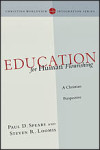 Related to our series on Education for Human Flourishing: A Christian Perspective (Paul D. Spears and Steven R. Loomis, InterVarsity Press, 2009),* below is an email I received regarding the purpose of education. Agree/disagree? Thoughts/reactions?
Related to our series on Education for Human Flourishing: A Christian Perspective (Paul D. Spears and Steven R. Loomis, InterVarsity Press, 2009),* below is an email I received regarding the purpose of education. Agree/disagree? Thoughts/reactions?
The purpose of education is to learn how to learn, some say. … I’d say, to learn how to teach yourself. … The teacher is a coach to assist in the process. …”Dead Poets Society” and other movies picture the teacher as this mother bird throwing out worms to hungry little mouths, taking in the teacher’s great knowledge. … That’s ridiculous. … At high school I had to learn to teach myself. … I can’t learn from someone talking to me, unless I can dialog with them, and ask a thousand questions. … I have a German type mind, until I see how all the pieces fit together, I don’t understand. … When I teach a new topic, I often have to meditate on the concepts for many weeks before it’s internalized, and I have almost a mental picture and feeling for the totality of the topic. … Then I’m ready to move around, answer questions, give analogies, examples. … and feel comfortable. … Poor math teachers just stand there and give procedures: do this, then this, then this. … Don’t ask any questions. … Just do it. … It’s terrible…
Comment: I must confess it’s hard for me to knock Dead Poets Society (1989), a film of my high school years which depicted what I lacked for a stretch of my education, but found in a significant form during my years at Grove City College. Upon further reflection, I think that at Grove City College I entered some classes (by accident and others by intentional deliberation) of self-motivated students coached/taught well by self-motivated, inspirational faculty who served as excellent mentors in/out of the classroom. Furthermore, this experienced Mathematics Professor describes my mode of learning/teaching. Still processing and very much interested in your comments.
*In order to return to the series, I will probably give it a particular day in the week so Wednesdays can have another topic of consideration. Stay tuned.
Tom enjoys daily conversations regarding living out the Biblical Story with his wife Theresa and their four girls, around the block, at Elizabethtown Brethren in Christ Church (where he teaches adult electives and co-leads a small group), among healthcare professionals as the Northeast Regional Director for the Christian Medical & Dental Associations (CMDA), and in higher ed as a volunteer with the Emerging Scholars Network (ESN). For a number of years, the Christian Medical Society / CMDA at Penn State College of Medicine was the hub of his ministry with CMDA. Note: Tom served with InterVarsity Christian Fellowship / USA for 20+ years, including 6+ years as the Associate Director of ESN. He has written for the ESN blog from its launch in August 2008. He has studied Biology (B.S.), Higher Education (M.A.), Spiritual Direction (Certificate), Spiritual Formation (M.A.R.), Ministry to Emerging Generations (D.Min.). To God be the glory!

I really enjoy having these thought provoking questions pop up on facebook, so thanks!
I’ve been digging deeper into critical thinking and team-based learning, methods advocated for at my institution by our on-campus institute for learning how to teach, learn & lead. I was frustrated by the common model of simply restating readings, and thinking that was the only way to make sure students “got it”. I driven toward more applied, experiential knowledge, and was happy to find a model that motivates students to read the material in advance, and gets them to actively synthesize and evaluate this new knowledge through a team activity that forces them to learn from one another and reach consensual decisions on a real problem. Individual assignments build upon this and gives a further opportunity to focus what they learn from the readings, me, and from one another in groups on an applied problem that emphasizes critical thinking and creativity, rather than regurgitation. I find the use of all of these different mechanisms reaches out well to students with a variety of learning preferences: those who like to read quietly, those who like to discuss, those who like to listen, and those who like to write.